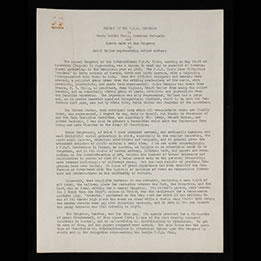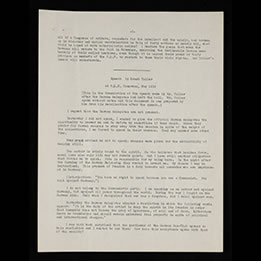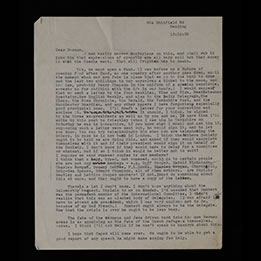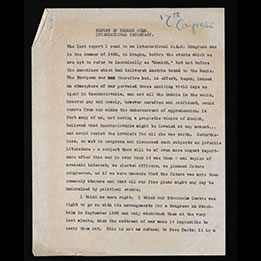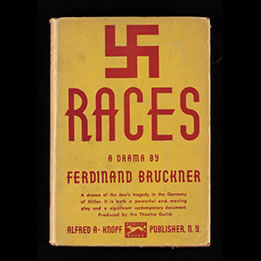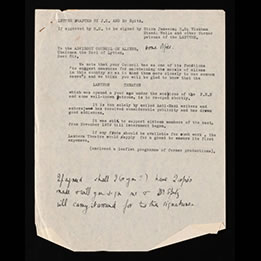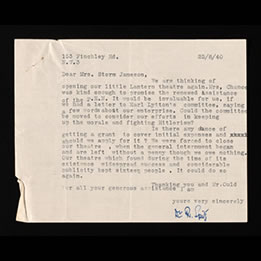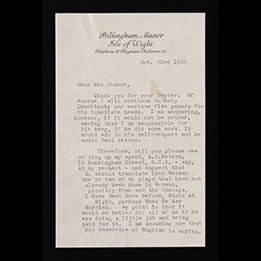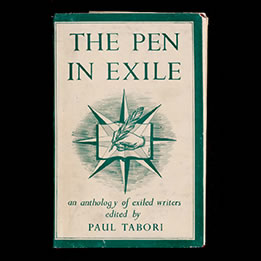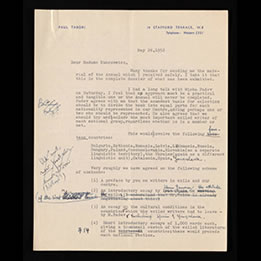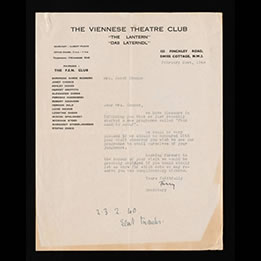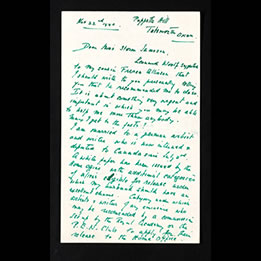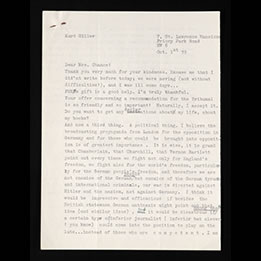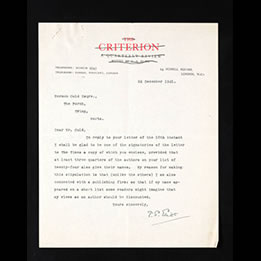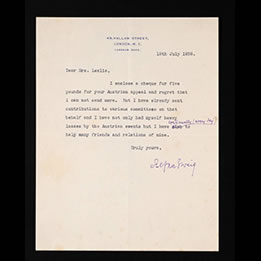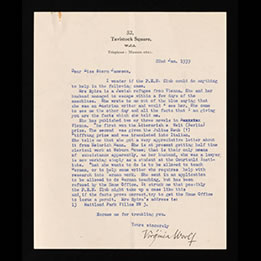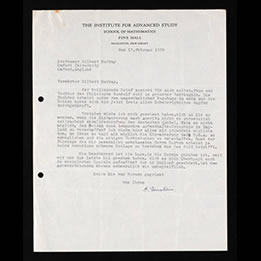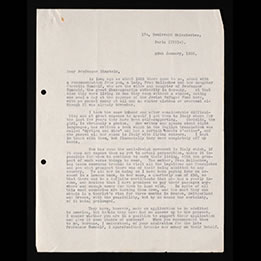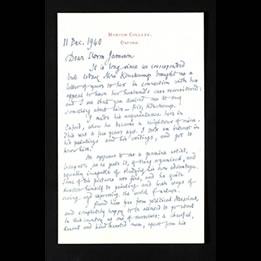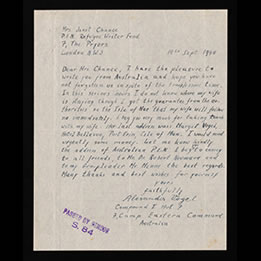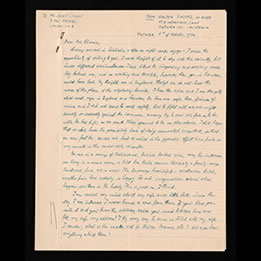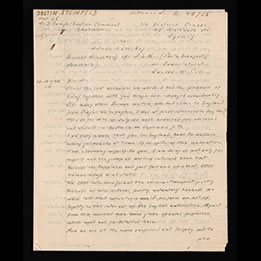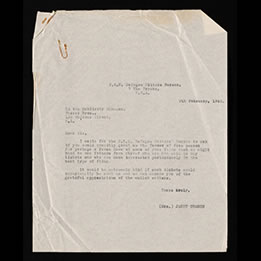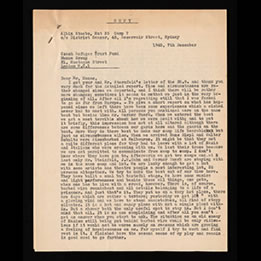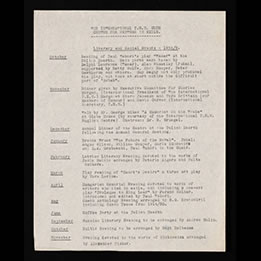International Human Rights
Writers and Free Speech
Writers in Exile / Global Refugees
Writing the Cold War
Writing World War II
Digital Collections
Writers in Exile / Global Refugees
This material highlights PEN's engagement with displaced authors, playwrights, scientists, and intellectuals
forced to flee their home nations by the tumultuous political events of the twentieth century. PEN's role as a
global human rights organization proceeded from the urgent need to respond to the international refugee crisis
created by the rise of fascism in Europe. While the organization had begun as an avowedly apolitical
association of writers, PEN was forced to assume a more outspoken political stance when faced with new
totalitarian governments that opposed its founding liberal principles of intellectual freedom, free speech,
and cultural exchange. Through the tireless work of administrators like Storm Jameson, Janet Chance, and
Hermon Ould, PEN mobilized itself to assist writers and artists displaced by World War II, providing funds,
legal advice, and political advocacy. This work would lay the foundation for PEN's later efforts on behalf of
exiled and imprisoned writers in the Soviet Bloc, Africa, China, the Gulf States, and around the globe. These
materials from the PEN Records will be of interest to courses exploring twentieth-century European history,
international human rights, Jewish and Holocaust studies, NGOs, the rise of Fascism in Germany, modernist art
and literature, and intellectual freedom.
Origins: PEN and Refugee Writers
The early 1930s saw a flood of writers, artists, and intellectuals fleeing the rise of the Nazi Party in
Germany, which began to openly persecute Jewish and LGBTQIA+ writers, along with any outspoken critics of
Hitler's regime. Many sought refuge in Britain, or passed through London in attempts to reach Canada or the
United States. This flood of refugee writers was a major catalyst for PEN's transformation from an informal
supper club into an international political organization, as its leaders struggled to address the many wartime
crises facing writers around the globe. These items reflect this origin story, demonstrating the political
stance PEN was forced to take in response to Nazi censorship and the early efforts of its leadership to offer
support to whole populations of displaced Austrian, German, Czech, and Polish writers.
View Item
Report on the 1933 Dubrovnik PEN Congress by Henry Seidel Canby. 1933.
PEN Records 82.1
View Item
Transcribed speech by Ernst Toller on behalf of exiled German writers. May 1933.
PEN Records 82.1
View Item
Letter from Storm Jameson to Hermon Ould. October 13, 1938.
PEN Records 28.3
View Item
Report to the 17th International PEN Congress, London, by Hermon Ould. 1941.
PEN Records 86.1
Exiles and the Stage
While displacement presents a number of obstacles to any working artist, few are as directly impacted as
playwrights, whose work is dependent upon a number of factors—including actors, theatre professionals, and the
availability of performance venues. During the war, PEN struggled to provide resources to refugee playwrights,
interceding on their behalf with the Lord Chamberlain's censors, finding them sponsors and work as translators
of English-language plays, and even sponsoring a small German-language theatre company in London. Students
might use these materials to discuss the development of theatre as a particularly political response to the
crisis of the war, offering a rare platform for public critiques of totalitarianism, and for gathering
scattered exile communities together around a shared cultural event.
View Item
Races, a drama by Ferdinand Bruckner [pseud.] translated from the German for the first time by
Ruth Langner. 1934.
PT 2642 A3 R32 1934 HRC-TA
View Item
Letter from Rudolf Spitz and Janet Chance to the Advisory Council on Aliens regarding the Lantern
Theatre. Circa 1939.
PEN Records 97.3
View Item
Letter to Storm Jameson from Rudolf Spitz. August 25, 1940.
PEN Records 223.1
View Item
Correspondence between PEN Refugee Writers Fund and J. B. Priestley regarding Richard Duschinsky.
1939.
PEN Records 96.3
Arts in/of Exile
In addition to its efforts to assist exiled writers and artists financially, PEN also aimed to create spaces
for them to continue their creative work. These materials highlight several of the ways in which PEN managed
to do so: from publishing anthologies and fostering collaborations to sponsoring local theatre groups and
advocating for increased paper allowances in wartime. These materials offer students an opportunity to observe
the realities shaping artistic production in times of crisis, and to consider the close links between
literature and politics in contexts of war and revolution.
View Item
The Pen in Exile: an Anthology of Exiled Writers. Paul Tabori, editor. Published by the
International P.E.N. Club Centre for Writers in Exile. 1954.
PN 6019 T3
View Item
Letter from Paul Tabori to Maria Kuncewiczowa. May 26, 1952.
PEN Records 155.4
View Item
Letters from The Viennese Theatre Club to Janet Chance. February 20, 1940; May 4, 1940.
PEN Records 98.1
From Advice to Advocacy: PEN and the U.K. Government
While PEN's Refugee Writers Fund began as a humble effort to aid writers fleeing Nazi Germany, after the
official declaration of war it became caught up in the massive bureaucratic effort to distinguish between
refugees and so-called "enemy aliens" living in the U.K. Often, this work involved locating sponsors to vouch
for refugee writers' character, citing evidence of anti-fascist activism in their home countries, and
guaranteeing financial support for writers unable to find legal employment. These items highlight not only
PEN's efforts, but also the extreme precariousness facing writers from enemy nations during the war: many were
interned, arrested, and even held in camps alongside the very Nazi supporters from whom they had originally
fled. Students approaching these materials might ask what they reveal about the tensions between national and
individual identity, and how even relatively progressive governments justify suspending the rights of foreign
nationals—even those in utmost sympathy with their new place of residence—in times of war or conflict.
Students might also notice that an unusually high number of interned Austrian and German refugees were of
Jewish descent (and therefore highly unlikely to be Nazi sympathizers): a fact rarely acknowledged or taken
into account in the proceedings at the time.
View Item
Letters from PEN Refugee Writers Fund to the Tribunal Dealing with Enemy Aliens. 1939.
PEN Records 97.5
View Item
Letters from Cecil Könekamp to Storm Jameson regarding Fritz Rudolf Könekamp. December 15, 1940.
PEN Records 94.5
View Item
Letters from Kurt Hiller to Janet Chance. September 21, 1939; October 1, 1939.
PEN Records 94.1
View Item
Letters from T. S. Eliot to Hermon Ould and to the editor of The London Times. December 24,
1941.
PEN Records 15.2
Refugee Networks
With the flood of refugees fleeing the expansion of Nazi Germany, PEN was overwhelmed with requests from
authors, playwrights, artists, and other writers for support and sponsorship. As the UK Government implemented
increasingly strict requirements for foreign visas, many prominent writers found themselves advocating for
friends and colleagues attempting to flee mainland Europe. These materials demonstrate the many ways in which
PEN, along with writers and thinkers like Virginia Woolf, Stefan Zweig, and Albert Einstein, wielded literary
influence to advocate for refugees. They also invite questions from students regarding the limitations and
privilege of this approach: what happens, for example, to refugees without famous acquaintances or a
well-known body of work? For that matter, what happens to refugees without a literary background, or
professional status who might alert organizations like PEN to their plight?
View Item
Letters from Stefan Zweig to PEN Refugee Writers Fund and Hermon Ould regarding Alfred Wolfenstein.
1938.
PEN Records 76.6
View Item
Letter from Virginia Woolf to Storm Jameson. January 22, 1939.
PEN Records 97.3
View Item
Letter from Albert Einstein to Professor Gilbert Murray. February 15, 1939.
PEN Records 93.5
View Item
Letter from Henry Harben to Albert Einstein regarding Frau Mallachow and Cordelia Gundolf. January
28, 1939.
PEN Records 93.5
View Item
Letter from Edmund Blunden to Storm Jameson on behalf of Fritz Rudolf Könekamp. December 11, 1940.
PEN Records 94.5
From Exile to Internment
Many writers fled Austria and Germany during the Nazi Party's rise to power in the 1930s and settled in
Britain, where they continued their work and criticism of Hitler's government. After the invasion of Poland,
however, these writers were subject to internment as citizens of a hostile foreign power. These letters are
from a group of writers, totalling nearly 2,000 Austrian, German, and Czech men, sent to internment camps in
Australia after the outbreak of war. Over 10,000 internees were shipped abroad, most to Canada but many,
including Vogel and a number of refugee writers, to the Australian camps. Clippings in the collection describe
a scandal in which many of the internees on board the Dunera had their belongings stolen by U.K. military
servicemen. In many cases, former refugee writers found themselves on these ships and even in camps with the
Nazis and Italian fascists from whom they had originally fled. After an eight-week journey aboard ship,
internment in the Australian bush, and complete separation from spouses and families left back in England,
these writers appealed to PEN and every other available source for advocacy and help reaching their relatives
back in England.
View Item
Letter from Alexander Vogel to Janet Chance, PEN Refugee Writer Fund, with
copy of typed statement addressed to P.E.N. Club New York. September 19, 1940.
PEN Records 95.2
View Item
Letter from Walter Schultz to Janet Chance. October 4, 1940.
PEN Records 95.2
View Item
Letter from Justin Steinfeld to Hermon Ould. November 12, 1940.
PEN Records 223.1
Exile and Everyday Life
The effects of displacement on individual lives are often hard to trace, with organizational records tending
to focus on official documents, correspondence, and legal proceedings. Yet within the extensive correspondence
between PEN and the exiled writers it sought to help, there are a number of personal accounts that offer a
glimpse of everyday life in exile. These items illustrate the impact of displacement on family life, leisure,
and the creative work that writers still sought to achieve even under highly constrictive circumstances.
Students working with these materials might be invited to consider the human impact of political displacement:
what aspects of daily life, work, and relationships are disrupted in refugees' lives? What effect does this
disruption have, not only on writers' literary output, but also on their politics and their ability to be
heard or even to continue writing?
View Item
"Ambros Family Circular" by Liba Ambrosova. December 1940.
PEN Records 92.1
View Item
Letter from PEN Refugee Writers Fund to Warner Bros. February 9, 1940.
PEN Records 98.2
View Item
Copy of typescript letter from Albin Stuebs to Czech Refugee Trust Fund. December 7, 1940.
PEN Records 95.2
View Item
Literary and Social Events schedule for the London PEN Writers in Exile Centre. 1954–1955.
PEN Records 155.4
We have attempted to minimize harm or adverse impact by selecting primary sources
that we believe will not place people at risk. Please notify us at reference@hrc.utexas.edu if you believe we need to remove any
materials from this digital collection.
Takedown Notice: This material is made available for education and research
purposes. The Harry Ransom Center does not own the rights for these items; it cannot grant or deny permission
to use this material. Copyright law protects unpublished as well as published materials. Rights holders for
these materials may be listed in the WATCH
file. It is your responsibility to determine the rights status and secure whatever permission may be
needed for the use of any item. Due to the nature of archival collections, rights information may be
incomplete or out of date. We welcome updates or corrections. Upon request, we'll remove material from public
view while we address a rights issue.


